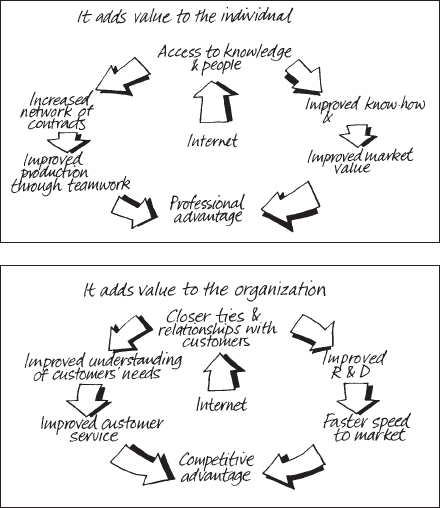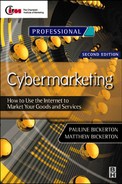Read this first!
The Internet is no longer new. Most firms use it as an indispensable communications tool. It is an established focus of advertising spending. It is the biggest growing channel for sales and investment in any marketplace. Internet start-ups have become established companies, and the big players from the ‘real world’ have moved online. The once unexplored land has been colonized, and the rules of this new territory have started to become defined.
Since the first edition of Cybermarketing set out the core principles that would guide marketers as they went online, we have been learning from hundreds of companies as they started to market using the Internet. We believe that the experiments and successes of these early users have yielded important lessons. In this new edition, we have incorporated a vast amount of experience to set out what we believe is the established framework for success in the increasingly important virtual world.
The core of our vision of successful Internet marketing is the customer. While some firms have been led astray by technology and IT, the truly successful have used the net to apply the core concepts of traditional marketing in a new and powerful way. The paradox is clear. ‘Customer focus’ is traditional thinking, but its application on the net involves new and non-traditional approaches. Combining the best of the old and the new is the key to success on the Internet. This book is full of stories of companies adopting exactly that approach. In your world, the same model can bring you professional and organizational success, and this book will show you how to achieve it.
Focus on the customer
Internet technology has developed in an extraordinary way over the past decade. The numbers of users has risen exponentially, their computers have become faster and faster, and the software and lines that determine speeds of connection are becoming more and more sophisticated. More users, even faster computers and still broader-band lines are all on the way. But, however impressive, this technology does not, in itself, matter. The key is to understand the customers who use the network. As the Internet matures, it's becoming increasingly clear that the successful firms are the ones that build their businesses around people. Understanding why people use the net, what they expect from it, and how they communicate across it is critical to successful Internet marketing. In the early days of the technology, IT programmers took the lead. Now it's all about marketing.
Why the net gives the consumer more power
Marketers know that consumers always come first. But on the Internet their behaviour and preferences matter even more than they do in the traditional marketing environments like shops, television commercials and newspapers. On TV you can broadcast an advert into someone's home, and unless they're quick with the remote, they'll see it whether or not they want to. They don't choose to watch the adverts, but see them by accident. When a customer answers a call from a telephone sales firm he/she picks up the receiver because he/she doesn't know who's calling. (Anyone who has ever done telephone sales knows that they would get few replies if customers could tell who was on the phone!) If you're driving a car, it's hard to avoid seeing the billboards. Marketers have a certain degree of power, therefore, which expresses itself even in the language of the profession. They talk about ‘penetrating’ corners of a market, and ‘exploiting’ niches.
Online, different rules apply. Set up a website, and your potential customers have to choose to visit it. They have to type in your web address (your ‘URL’) into the top line of their web browser, and you can't do it for them. The customer is in control. It's as if the phone at home rang flashing a message, ‘Double glazing salesman calling’, and offered the user the choice, ‘Answer or disconnect?’ Web advertising presents the same picture. Web-ads are small – they have to be to leave room for the information that attracts visitors to the site where they are hosted. As a result they can't carry much information. To find out what the product's really about, Internet users have to click on the advert to reveal more details. Once again, the Internet user has the choice. It's not hard to see why the ‘customer first’ principle of marketing matters so much more on the net.
For companies, this means creating Internet materials that will entice users to choose to look at them. The customer must get something out of the experience, and so 90 per cent of what you do on the Internet must add value, 10 per cent can sell – any other combination fails. If you don't do this, your expensive website will lie dormant, ignored and unvisited by the Internet millions who know that they are in control. But if you do provide value, and present your public with offers, information and material they want to look at, you will be rewarded by access to a market that now encompasses most of the developed world.
Why has the Internet been so successful?
Millions of words have now been written explaining the success of the Internet. For the marketer, the most useful perspective is the user's. The Internet offers the user a cheaper, quicker and easier route to achieving various goals than any other technology. If, for example, you want to find some information, you may have to choose between going to the library, or going online. Logging on will save you time and effort (and probably money – there's no bus fare or petrol costs to pay). Not surprising, then, that so much information is collected from the net. Perhaps you want to buy something? If you travel to your local shop, you don't know if what you want will be in stock, and you don't know that the price will be competitive. Indeed, you may have to visit – or telephone – several shops to get the best deal. Online you can find a supplier and compare prices much more easily. If you think of the trouble taken to find information or compare prices in the real world as a ‘cost’, then it's clear that these costs fall online. The Internet allows its users to save costs, and so millions of people use it.
It also allows the firms supplying goods on the net to save costs. It's cheaper to store goods in a remote warehouse than in an Oxford Street store, and there are no sales assistants to pay. It's easier to do market research and sector analysis using online technology. As a result the online traders can undercut high street rivals, and pass at least some of this saving on to the consumer. Once again, the Internet offers lower costs and greater value to its customers. The success of the Internet, therefore, can be understood in simple, customer-focused, economic terms. It offers value.
Who benefits?
We have already seen that customers can benefit and online firms can benefit from the net. But so too can individual professional staff: the Internet offers you something, too! It enables the individual to gain and sustain competitive advantage by providing a knowledge base and professional network of contacts. Successful people will be working smarter not harder; leveraging a network of contacts rather than re-inventing the wheel; relying on other people's knowledge bases rather than recreating one. Communicating will become critical to success and the Internet will be critical to communication. As Mary Cronin put it, ‘Managed strategically, the Internet offers more than just a global lifeline to the future. It can become the key ingredient to leadership in the age of interconnectivity’.

Ongoing support – the Cybermarketing website
This book has been written to help you assess the Internet for yourself, and the book is accompanied by information on the Internet at:
We have created an accompanying website for three reasons:
- to offer new users of the Internet a quick and easy way to get online and access relevant, professionally supportive information. The site also provides an easy one-stop shop to searching on the Internet, access to numerous sites which will excite and interest you, giving advice and reinforcing the messages in this book as you go.
- to strip out the Internet gobbledegook which appears in many of the Internet books, and enable you to look behind the hype and the mystique at some of the practical issues surrounding the Internet.
- to help you keep up to date. The principles in this book are now established, but the rapid pace of Internet evolution means points of fact will constantly change. The website allows us to present new and important developments which occur after publication.
The website works by displaying a summary of each chapter and linking references within it to the relevant companies’ information on the Internet. Rather than giving the full Internet address, we include a link from the accompanying chapter online direct to these companies’ websites.
So whenever you see a company name italicized in this book, it implies that there is a reference to it on the accompanying web chapter, e.g. CD-Now implies a web-page which you can visit by jumping from the accompanying web chapter.
Conclusion
This book will show you how to apply traditional marketing concepts for successful marketing using the Internet. It will also highlight challenges that a marketing person will face when confronted with this new medium and show in detail how successful companies have tackled these issues.
References
Business & Technology Magazine (Sept. 1995) published by Cromwell Media Ltd, London.
Mary Cronin (1995) Doing More Business On The Internet, Van Nostrand Reinhold, New York.
